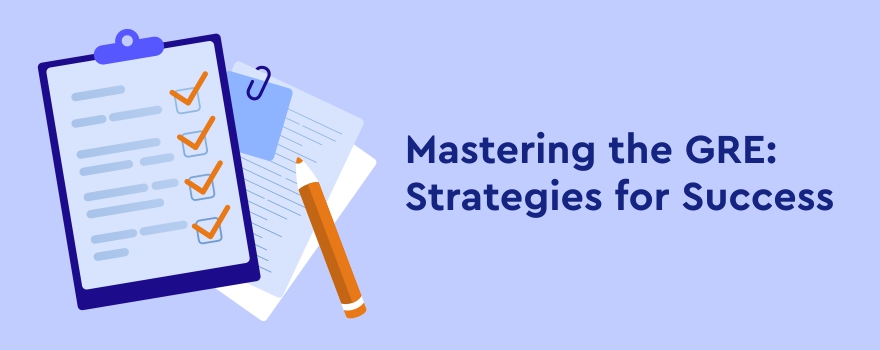The GRE: a three-letter acronym that can shape the trajectory of your academic and professional journey. Will you approach it with focus and determination? Or will you give in to distractions and obstacles?
Welcome to our comprehensive guide for mastering the Graduate Record Examinations (GRE), a critical component of the graduate school application process. The GRE challenges you to demonstrate your abilities in verbal reasoning, quantitative reasoning, and analytical writing. Achieving a high score on this test can significantly enhance your application, making a compelling case for your admission into competitive graduate programs.
This guide covers the GRE's structure and offers effective study techniques, test-taking strategies, and advice on maintaining mental and physical well-being. Each chapter is designed to provide the tools and knowledge necessary to approach the GRE with confidence. From understanding the intricacies of the exam to optimizing your study habits and managing stress, you'll discover strategies to help you perform at your best.
As you read this guide, consider each piece of advice a part of a broader strategy for success. Whether you are beginning your GRE preparation journey or seeking to improve your study methods, this guide will support and motivate you. With dedication, the right preparation, and a positive mindset, you can ace the GRE and pave the way to success.
Understanding GRE Structure and Content

The GRE is a comprehensive test that evaluates your readiness for graduate-level work. The exam is divided into three main sections: Analytical Writing, Verbal Reasoning and Quantitative Reasoning. Familiarizing yourself with the format and content of these sections is the first step in preparing for the exam.
Knowing what to expect can significantly reduce stress and allow you to focus on showcasing your abilities.
Key Components to Master
- Verbal Reasoning: This section tests your ability to analyze and draw conclusions from discourse, understand and apply vocabulary, and understand the structure of texts. It consists of reading comprehension, text completion, and sentence equivalence questions.
- Quantitative Reasoning: Focused on basic mathematical skills and understanding of mathematical concepts, this section covers arithmetic, algebra, geometry, and data analysis. It tests your ability to solve problems using quantitative methods.
- Analytical Writing: This section assesses your critical thinking and analytical writing skills. It requires you to articulate complex ideas clearly and effectively, supporting your ideas with relevant reasons and examples. The section includes two tasks: "Analyze an Issue" and "Analyze an Argument."
- Test Format: Understanding whether you will take the computer or paper GRE is crucial, as this can affect your preparation, especially in terms of time management.
Dive Deeper
- ETS GRE Official Guide: detailed information on test structure, sample questions, and preparation tips directly from the test makers
- Magoosh GRE Overview: comprehensive insights into the GRE structure, along with strategies for tackling each section of the test
Mastering the Fundamentals
Understanding the GRE's structure and the types of questions you'll encounter is foundational to your study plan. With a clear picture of what lies ahead, you can adequately prepare to address each section effectively.
As we move to the next chapter, we'll explore effective study techniques and resources that will help you build on this foundation.
Effective Study Techniques and Resources

Acing the GRE requires more than just understanding the test's structure; you need a well-designed study plan with effective techniques and top-notch resources.
This chapter delves into strategies that have been proven to enhance retention, improve problem-solving skills, and ensure you're prepared. Tailoring your study approach to fit your learning style and focusing on areas that need improvement can significantly boost your GRE score.
Study Methods
- Active Recall and Spaced Repetition: Use flashcards and spaced repetition software to improve your recall of GRE vocabulary and mathematical formulas. Active recall helps strengthen memory, while spaced repetition increases the time intervals between review sessions to enhance retention.
- Practice Tests: Taking timed full-length practice tests is crucial. This not only helps you become familiar with the format and pacing of the test, but it also helps you identify your strengths and areas for improvement.
- Error Analysis: After each practice test or study session, spend time reviewing incorrect answers to understand your mistakes. This analysis will help you adjust your study strategy and avoid similar errors in the future.
- Study Groups: Joining or forming a GRE study group can provide motivation, different problem-solving methods, and accountability. Explaining concepts to others is also a fantastic way to reinforce your own understanding.
Explore More
- Kaplan Test Prep: a range of GRE preparation materials, including practice tests and study plans to help you tailor your review sessions effectively
- The Princeton Review GRE: comprehensive GRE prep courses, free practice tests, and a wealth of strategies for tackling each section of the GRE
Using the Right Resources
Adopting effective study techniques and using the right resources are critical components of a successful GRE preparation strategy. By incorporating these methods, you can enhance your understanding, improve your scores, and approach the GRE with confidence.
Next, we'll explore time management and test-taking strategies to optimize your performance and ensure you prepare effectively.
Time Management and Test-Taking Strategies
One of the keys to excelling on the GRE is managing your time and approaching the test strategically. The ability to allocate your time wisely across sections and questions, coupled with smart test-taking tactics, can significantly enhance your performance.
Smart Tips for Success
- Time Allocation: Familiarize yourself with the time limits for each section and develop a pacing strategy. Practice dividing your time so that you can comfortably answer all questions without rushing.
- Question Order: Learn to quickly assess questions and decide which ones to tackle first. One option is to focus on answering easier questions to secure points, and then return to more challenging ones if time permits. Another strategy is to tackle them sequentially, if that feels more natural.
- Educated Guessing: If you’re stuck on a question, use the process of elimination and make an educated guess. Eliminating answers that are clearly wrong increases your chances of selecting the correct one.
- Stress Management: Implement relaxation techniques such as deep breathing or visualization to calm test day nerves. When you’re relaxed, you’re more focused and can better solve problems.
Learn More
- ETS Test-Taking Strategies: official advice on managing your time and strategies for approaching different question types on the GRE
- Khan Academy Test Prep: general test preparation resources from a leader in the field, including time management tips that are applicable to various types of standardized testing
Making the Most of Your Time
Effective time management and strategic test-taking are as critical to acing the GRE as your academic knowledge. By practicing these strategies, you can improve your efficiency and accuracy on test day.
Next, let's consider how prioritizing your mental and physical well-being throughout your GRE preparation can further influence your performance, ensuring the best possible results.
Mental and Physical Well-Being
While preparing for the GRE, it's essential to understand the impact of your mental and physical health. High levels of stress and neglecting self-care can undermine even the best efforts.
This chapter shares strategies to maintain your well-being, ensuring you're mentally and physically prepared to tackle the GRE with confidence and resilience.
Strategies for Well-Being
- Regular Exercise: Incorporate physical activity into your daily routine to boost your mood, reduce stress, and increase energy levels. Even short walks or quick workouts can have a significant impact.
- Nutrition and Hydration: Focus on a balanced diet rich in nutrients that support brain function and energy. Stay hydrated to maintain concentration and cognitive performance.
- Adequate Rest: Prioritize getting enough sleep, especially in the days leading up to the test. A well-rested mind is more alert, focused, and capable of critical thinking.
- Mindfulness and Relaxation: Practice mindfulness or meditation techniques to manage stress. Techniques such as deep breathing, visualization, or progressive muscle relaxation can help create an optimal state for high performance.
Additional Resources
- Headspace for Students: guided meditations and mindfulness practices tailored for students, helping reduce stress and improve focus
- Nutrition Tips for Brain Power: dietary recommendations from nutrition experts to boost brain power and performance
Integrating Holistic Self-Care
Your mental and physical well-being play a crucial role in performing optimally on the GRE. By integrating these self-care practices into your study routine, you can ensure that you're in the best possible state of mind and body to succeed.
As we conclude discussing mental and physical well-being, let's shift our focus to the test day itself. Next, we’ll explore essential strategies for optimizing your performance on the GRE, ensuring that you can apply your knowledge and skills effectively when it matters most.
Strategies for Optimal Performance

The moment you sit down to take the GRE represents the culmination of your efforts. However, excelling on test day involves more than just the knowledge you've accumulated; it requires a strategic approach to navigating the exam itself.
This chapter is dedicated to providing you with strategies that can enhance your performance, helping you apply what you've learned efficiently and effectively. Remember, success on the GRE depends almost as much on how you take the test as what you know.
Keys for Success
- Read Instructions Carefully: Take the time to thoroughly understand the instructions for each section before beginning. This ensures you won’t lose points due to simple mistakes.
- Manage Your Time Wisely: Keep a close eye on the clock and allocate your time strategically across questions. Don't spend too much time on any single question; instead, move on and return to it if time permits.
- Answer Every Question: There's no penalty for wrong answers on the GRE, so make sure to answer every question. Even if you're unsure, your educated guess could be correct.
- Use the Mark and Review Feature: Take advantage of the test's mark and review functionality to mark questions you're unsure about. This allows you to easily return to them later if you have time.
- Stay Calm and Focused: Maintain a calm and positive mindset throughout the test. If you start to feel overwhelmed, take a moment to breathe deeply and refocus. Taking slow, deep breaths can resettle your mental state and help you return to a state of peak performance.
Learn More
- GMAT Ninja Mindfulness Preparation: guidance on how to use mindfulness to improve your performance on high-stakes exams
- Intelligent Test-Taking Strategies: tips on maintaining an optimal approach before and during the test
Preparing for Success
Adopting a strategic approach on test day can make a significant difference in your GRE performance. By preparing mentally and strategically, you can navigate the GRE with the confidence and calm necessary for success.
Let's move forward and discuss what to do after the test, ensuring your GRE achievements pave the way for a successful future.
After the GRE: Planning Your Next Steps

Completing the GRE is a significant milestone in your journey toward graduate school.
This chapter will guide you through the post-GRE phase, helping you interpret your scores, decide on potential retakes, and effectively incorporate your results into your graduate applications. With a strategic approach, you can maximize the impact of your GRE performance on your academic and professional future.
Making Plans After the GRE
- Understand Your Scores: Familiarize yourself with the scoring system to evaluate how your scores align with the requirements of your target programs. ETS provides detailed explanations of score ranges and percentiles.
- Consider a Retake: Analyze your scores and decide if retaking the GRE could improve your chances of admission to your desired programs. Consider factors like program deadlines, preparation time, and score improvement strategies.
- Incorporate Scores into Applications: Highlight your GRE scores in your application. Use your personal statement to discuss how your GRE performance, combined with other academic and extracurricular achievements, makes you a strong candidate.
- Seek Feedback and Advice: Consult with mentors, advisors, or GRE prep professionals to understand your competitiveness and receive personalized advice on improving your application.
Research Further
- ETS Score Interpretation Guide: official guide to understanding your GRE scores and how they're calculated
- GRE Retake Considerations: advice on evaluating whether to retake the GRE based on your scores and goals
Exploring Your Options
Once you’ve completed the GRE and considered your broader academic goals, it's time to look ahead.
As we explore how you can leverage your GRE results for your academic and career goals, remember that this journey has equipped you with insight and experience that will serve you well in the future.
Leveraging GRE Success for Academic and Career Goals
Achieving a great score on the GRE can be a launching pad for your academic and career endeavors.
This chapter explains how your GRE performance can influence your path toward an advanced degree and open doors to career opportunities aligned with your passions and goals.
Maximizing Your GRE Score
- Graduate Program Selection: Use your GRE scores to target graduate programs that align with your interests and career goals. Higher scores can increase your chances of being accepted into competitive programs.
- Scholarship Opportunities: Many institutions offer scholarships based on GRE scores. Achieving high scores can qualify you for financial aid, reducing the financial burden of graduate studies.
- Career Development: Your GRE scores, coupled with a strong academic record, can make you a more attractive candidate for future employers, especially in fields that value analytical and quantitative skills.
- Networking and Professional Growth: Graduate school provides numerous opportunities for networking with professionals, faculty, and peers who can play a significant role in your career development. Your GRE score is the first step in accessing these valuable resources.
Leveraging GRE Success
- GRE Role In Applications Guide: insight into how GRE scores are viewed by graduate programs and tips for using your scores to your advantage
- GRE Scholarships: information on scholarships and financial aid opportunities available to students with outstanding GRE scores
Positioning Yourself for Growth
As we wrap up our discussion, it's clear that a high GRE score offers many benefits. Your GRE results can be a gateway to prestigious graduate programs, scholarships, and opportunities that align with your long-term goals. By strategically positioning your GRE scores within your broader academic and professional narrative, you can improve your potential for success in graduate school and your career.
Looking Beyond the GRE

The GRE is an integral part of your academic and career journey. By leveraging your GRE scores effectively, you can access a world of opportunities in graduate education and beyond.
As we conclude this guide, we want to emphasize that the strategies and insight shared are designed to empower you with the knowledge and skills necessary for success. However, the true journey lies in your commitment, perseverance, and strategic approach to the GRE. Embracing these strategies is about more than just preparing for a test; it's about setting the foundation for your future academic and professional endeavors.
Achieving a high score on the GRE opens doors to prestigious graduate programs and provides opportunities for scholarships, making your dream of further education more accessible and affordable. However, the benefits of diligent GRE preparation extend beyond the immediate rewards. The habits you develop, such as disciplined study routines, effective time management, and critical thinking, are invaluable assets that will serve you well in graduate school and your future career. These skills are the building blocks of success, preparing you to tackle complex challenges and seize opportunities with confidence and expertise.
The path ahead is full of opportunities, and with the strategies and insights you've learned, you will be equipped to succeed!
References for Further Reading
For those eager to dive deeper and expand their GRE preparation toolkit, below you'll find an organized list of the resources mentioned throughout this guide. These links offer further insight and strategies for success.
ETS GRE Official Guide: https://www.ets.org/gre/
Magoosh GRE Overview: https://magoosh.com/gre/
Kaplan Test Prep: https://www.kaptest.com/gre/
The Princeton Review GRE: https://www.princetonreview.com/grad/gre-test-prep?ceid=nav-gd/
ETS Test-Taking Strategies: https://www.ets.org/gre/revised_general/prepare/tips/
Khan Academy Test Prep: https://www.khanacademy.org/test-prep/
Headspace for Students: https://www.headspace.com/studentplan/
Nutrition Tips for Brain Power: https://www.eatright.org/
GMAT Ninja Mindfulness Preparation: https://www.gmatninja.com/test-anxiety/articles/mindfullness-and-mental-performance/how-mindfulness-meditation-can-improve-your-score/
Intelligent Test-Taking Strategies: https://www.intelligent.com/use-test-taking-strategies-on-exam-day/
ETS Score Interpretation Guide: https://www.ets.org/gre/test-takers/general-test/scores/understand-scores.html/
GRE Retake Considerations: https://www.prepscholar.com/gre/blog/should-i-retake-the-gre/
GRE Role In Applications Guide: https://www.manhattanreview.com/gre-role-in-application/
GRE Scholarships: https://brightlinkprep.com/can-you-get-a-scholarship/


